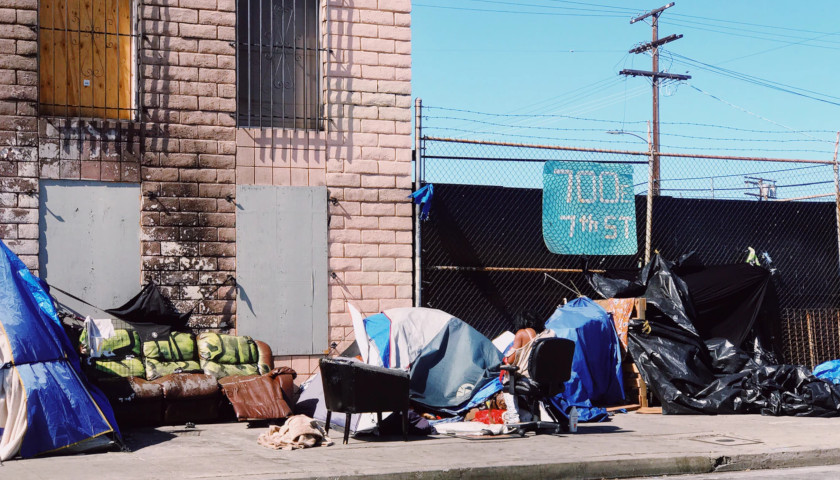by Debra Heine
An executive order signed by Joe Biden last week may force Americans to fully fund programs in San Francisco and other cities that provide housing for the homeless.
San Francisco reportedly spends between $15 million to $18 million per month to house more than 2,200 people in about 25 lodging establishments—some of them luxury hotels.
The Bay Area has one of the largest homeless populations in the country, and was forced in 2018 to employ “Poop Patrol” workers to clean human waste off the sidewalks.
Nancy Pelosi 112th District, San Francisco turned into slum. Pooping in the streets, homeless, criminals, & dirty needles litter street. 30 Million out of 60 Mill. city budget spent cleaning feces / drug needles off the street. #liberallogic #nancypelosi #SanFrancisco @tkinder pic.twitter.com/kU5gXEteKW
— Rinoswamp (@rinoswamp) February 22, 2018
The executive order stipulates that certain kinds of emergency housing for the homeless are eligible to be fully reimbursed through September 2021. Other programs to be fully reimbursed reportedly include “child-care facilities, domestic violence shelters and costs for personal protective equipment.”
San Francisco’s hotel rooms for the homeless were specifically mentioned in the directive, according to Fox News.
“I think it’s safe to say it will apply from now until September, for those that are eligible,” said City Controller Ben Rosenfield.
His team is waiting on more detailed guidance from the Federal Emergency Management Agency (FEMA) before announcing precisely how the program will be affected.
The department said last year it would reimburse San Francisco’s program until the end of the COVID-19 pandemic, but it never made clear how it would define the end.
Still, city officials welcomed the news on Thursday. The Trump administration never made clear when the funding would be cut off, prompting worry that the city would have to pay for the housing program entirely on their own and scramble to relocate the homeless.
San Francisco’s housing program, which was created last May in response to the pandemic, was meant to shift vagrants from tents and doorways to hotels. Homeless people deemed “most vulnerable to the virus” were supposed “shelter in place” in their hotel rooms, but a significant number of them don’t take the rules seriously, the New York Post reported last June.
These homeless hotel guests typically “suffer from drug addiction and severe mental illness as well as having criminal backgrounds,” the Post noted in an article condemning the program as a “failed experiment” that caused an “uptick in crime, drug activity and vagrancy around the hotels.”
Properties that have become de facto homeless shelters range from low-end haunts such as the Motel 6 to mid-range and boutique hotels. High-end hotels that house the homeless-turned-frontline-workers include the InterContinental San Francisco — and the Mark Hopkins.
The Department of Public Health manages the controversial free alcohol, cigarette and cannabis program for homeless people placed in the hotels. It originally claimed that money for the service came from private donations, which are not allowed by law. After multiple requests to provide the names of the donors, the DPH conceded that “No such record currently exists.” A public-records investigation into the matter has revealed that, as of June 16, DPH approved $3,795.98 to buy the homeless guests vodka and beer (cigarettes have been scrapped). The funding came from treasury after all.
According to the Post, city and hotel workers are required to sign nondisclosure agreements forbidding them from discussing that they see. Speaking out can result in a fine of up to $1,000, and/or a maximum one year prison sentence, per the Mayor’s Declaration of Emergency.
But that didn’t stop some concerned insiders from talking to the Post about the destroyed rooms and rampant illegal drug use they were witnessing.
In one hotel, guests are given needle kits and are advised to call the front desk before shooting up; there have been four deaths in the last few days. Sharps containers have been placed on every floor; used syringes are discarded haphazardly. Badly needed mental-health help is not being administered. The entire operation is disorganized, with staff members constantly moved around, never knowing what they’ll do from one day to the next. One source asked to make it clear that as public servants they love the city and all its inhabitants, but the plan has left them deeply demoralized.
As of last summer, Bay Area neighborhoods blighted by homelessness had shown no sign of improvement, the Post noted.
That’s not surprising, since change is not likely until the city disallows tents completely, abandons its hands-off drug-dealing and usage policies, and commits to treating people with addiction issues and mental illness — not giving them hotel rooms where they can overdose, whether alone or with others whom they bring into the property. At one FLWH hotel, a non-guest was recently found dead in the hallway, still clinging to a crack pipe.
Hillary Ronen, the San Francisco Department of Homelessness and Supportive Housing Supervisor, tweeted Thursday that Biden’s executive order was “fantastic.” Ronen can be seen in her Twitter avatar sporting a “ByeDon” 2020 tee shirt.
“Now we can open more spots for people experiencing homelessness to stay safe during the rest of this pandemic,” she gushed.
https://twitter.com/HillaryRonen/status/1352429409685262337?ref_src=twsrc%5Etfw%7Ctwcamp%5Etweetembed%7Ctwterm%5E1352429409685262337%7Ctwgr%5E&ref_url=https%3A%2F%2Famgreatness.com%2F2021%2F01%2F25%2Fbiden-executive-order-could-force-american-taxpayers-to-fund-san-franciscos-hotels-for-homeless-program%2F
– – –
Debra Heine reports for American Greatness.




